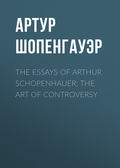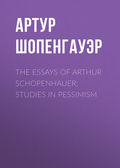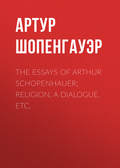
Артур Шопенгауэр
The World as Will and Idea (Vol. 3 of 3)
It is a disadvantage for the poetry of a language if it has many words which cannot be used in prose, and, on the other hand, dare not use certain words of prose. The former is mostly the case in Latin and Italian poetry, and the latter in French, where it has recently been very aptly called, “La bégeulerie de la langue française;” both are to be found less in English, and least in German. For such words belonging exclusively to poetry remain foreign to our heart, do not speak to us directly, and therefore leave us cold. They are a conventional language of poetry, and as it were mere painted sensations instead of real ones: they exclude genuine feeling.
The distinction, so often discussed in our own day, between classic and romantic poetry seems to me ultimately to depend upon the fact that the former knows no other motives than those which are purely human, actual, and natural; the latter, on the other hand, also treats artificial conventional, and imaginary motives as efficient. To such belong the motives which spring from the Christian mythus, also from the chivalrous over-strained fantastical law of honour, further from the absurd and ludicrous Germano-Christian veneration of women, and lastly from doting and mooning hyperphysical amorousness. But even in the best poets of the romantic class, e. g., in Calderon, we can see to what ridiculous distortions of human relations and human nature these motives lead. Not to speak of the Autos, I merely refer to such pieces as “No siempre el peor es cierto” (The worst is not always certain), and “El postrero duelo en España” (The last duel in Spain), and similar comedies en capa y espada: with the elements mentioned there is here further associated the scholastic subtility so often appearing in the conversation which at that time belonged to the mental culture of the higher classes. How decidedly advantageous, on the contrary, is the position of the poetry of the ancients, which always remains true to nature; and the result is that classical poetry has an unconditional, romantic poetry only a conditional, truth and correctness; analogous to Greek and Gothic architecture. Yet, on the other hand, we must remark here that all dramatic or narrative poems which transfer their scene to ancient Greece or Rome lose by this from the fact that our knowledge of antiquity, especially in what concerns the details of life, is insufficient, fragmentary, and not drawn from perception. This obliges the poet to avoid much and to content himself with generalities, whereby he becomes abstract, and his work loses that concreteness and individualisation which is throughout essential to poetry. It is this which gives all such works the peculiar appearance of emptiness and tediousness. Only Shakspeare's works of this kind are free from it; because without hesitation he has presented, under the names of Greeks and Romans, Englishmen of his own time.
It has been objected to many masterpieces of lyrical poetry, especially some Odes of Horace (see, for example, the second of the third book) and several of Goethe's songs (for example, “The Shepherd's Lament”), that they lack proper connection and are full of gaps in the thought. But here the logical connection is intentionally neglected, in order that the unity of the fundamental sensation and mood may take its place, which comes out more clearly just by the fact that it passes like a thread through the separate pearls, and brings about the quick changes of the objects of contemplation, in the same way as in music the transition from one key to another is brought about by the chord of the seventh, through which the still sounding fundamental note becomes the dominant of the new key. Most distinctly, even exaggeratedly, the quality here described is found in the Canzone of Petrarch which begins, “Mai non vo' più cantar, com' io soleva.”
Accordingly, as in the lyrical poem the subjective element predominates, so in the drama, on the contrary, the objective element is alone and exclusively present. Between the two epic poetry in all its forms and modifications, from the narrative romance to the epos proper, has a broad middle path. For although in the main it is objective, yet it contains a subjective element, appearing now more and now less, which finds its expression in the tone, in the form of the delivery, and also in scattered reflections. We do not so entirely lose sight of the poet as in the drama.
The end of the drama in general is to show us in an example what is the nature and existence of man. The sad or the bright side of these can be turned to us in it, or their transitions into each other. But the expression, “nature and existence of man,” already contains the germ of the controversy whether the nature, i. e., the character, or the existence, i. e., the fate, the adventures, the action, is the principal thing. Moreover, the two have grown so firmly together that although they can certainly be separated in conception, they cannot be separated in the representation of them. For only the circumstances, the fate, the events, make the character manifest its nature, and only from the character does the action arise from which the events proceed. Certainly, in the representation, the one or the other may be made more prominent; and in this respect the piece which centres in the characters and the piece which centres in the plot are the two extremes.
The common end of the drama and the epic, to exhibit, in significant characters placed in significant situations, the extraordinary actions brought about by both, will be most completely attained by the poet if he first introduces the characters to us in a state of peace, in which merely their general colour becomes visible, and allows a motive to enter which produces an action, out of which a new and stronger motive arises, which again calls forth a more significant action, which, in its turn, begets new and even stronger motives, whereby, then, in the time suitable to the form of the poem, the most passionate excitement takes the place of the original peace, and in this now the important actions occur in which the qualities of the characters which have hitherto slumbered are brought clearly to light, together with the course of the world.
Great poets transform themselves into each of the persons to be represented, and speak out of each of them like ventriloquists; now out of the hero, and immediately afterwards out of the young and innocent maiden, with equal truth and naturalness: so Shakspeare and Goethe. Poets of the second rank transform the principal person to be represented into themselves. This is what Byron does; and then the other persons often remain lifeless, as is the case even with the principal persons in the works of mediocre poets.
Our pleasure in tragedy belongs, not to the sense of the beautiful, but to that of the sublime; nay, it is the highest grade of this feeling. For, as at the sight of the sublime in nature we turn away from the interests of the will, in order to be purely perceptive, so in the tragic catastrophe we turn away even from the will to live. In tragedy the terrible side of life is presented to us, the wail of humanity, the reign of chance and error, the fall of the just, the triumph of the wicked; thus the aspect of the world which directly strives against our will is brought before our eyes. At this sight we feel ourselves challenged to turn away our will from life, no longer to will it or love it. But just in this way we become conscious that then there still remains something over to us, which we absolutely cannot know positively, but only negatively, as that which does not will life. As the chord of the seventh demands the fundamental chord; as the colour red demands green, and even produces it in the eye; so every tragedy demands an entirely different kind of existence, another world, the knowledge of which can only be given us indirectly just as here by such a demand. In the moment of the tragic catastrophe the conviction becomes more distinct to us than ever that life is a bad dream from which we have to awake. So far the effect of the tragedy is analogous to that of the dynamical sublime, for like this it lifts us above the will and its interests, and puts us in such a mood that we find pleasure in the sight of what tends directly against it. What gives to all tragedy, in whatever form it may appear, the peculiar tendency towards the sublime is the awakening of the knowledge that the world, life, can afford us no true pleasure, and consequently is not worthy of our attachment. In this consists the tragic spirit: it therefore leads to resignation.
I admit that in ancient tragedy this spirit of resignation seldom appears and is expressed directly. Œdipus Colonus certainly dies resigned and willing; yet he is comforted by the revenge on his country. Iphigenia at Aulis is very willing to die; yet it is the thought of the welfare of Greece that comforts her, and occasions the change of her mind, on account of which she willingly accepts the death which at first she sought to avoid by any means. Cassandra, in the Agamemnon of the great Æschylus, dies willingly, αρκειτω βιος (1306); but she also is comforted by the thought of revenge. Hercules, in the Trachiniæ, submits to necessity, and dies composed, but not resigned. So also the Hippolytus of Euripides, in whose case it surprises us that Artemis, who appears to comfort him, promises him temples and fame, but never points him to an existence beyond life, and leaves him in death, as all gods forsake the dying: – in Christianity they come to him; and so also in Brahmanism and Buddhism, although in the latter the gods are really exotic. Thus Hippolytus, like almost all the tragic heroes of the ancients, shows submission to inevitable fate and the inflexible will of the gods, but no surrender of the will to live itself. As the Stoic equanimity is fundamentally distinguished from Christian resignation by the fact that it teaches only patient endurance and composed expectation of unalterably necessary evil, while Christianity teaches renunciation, surrender of the will; so also the tragic heroes of the ancients show resolute subjection under the unavoidable blows of fate, while Christian tragedy, on the contrary, shows the surrender of the whole will to live, joyful forsaking of the world in the consciousness of its worthlessness and vanity. But I am also entirely of opinion that modern tragedy stands higher than that of the ancients. Shakspeare is much greater than Sophocles; in comparison with Goethe's Iphigenia one might find that of Euripides almost crude and vulgar. The Bacchæ of Euripides is a revolting composition in favour of the heathen priests. Many ancient pieces have no tragic tendency at all, like the Alcestis and Iphigenia in Tauris of Euripides; some have disagreeable, or even disgusting motives, like the Antigone and Philocteles. Almost all show the human race under the fearful rule of chance and error, but not the resignation which is occasioned by it, and delivers from it. All because the ancients had not yet attained to the summit and goal of tragedy, or indeed of the view of life itself.
Although, then, the ancients displayed little of the spirit of resignation, the turning away of the will from life, in their tragic heroes themselves, as their frame of mind, yet the peculiar tendency and effect of tragedy remains the awakening of that spirit in the beholder, the calling up of that frame of mind, even though only temporarily. The horrors upon the stage hold up to him the bitterness and worthlessness of life, thus the vanity of all its struggle. The effect of this impression must be that he becomes conscious, if only in obscure feeling, that it is better to tear his heart free from life, to turn his will from it, to love not the world nor life; whereby then in his deepest soul, the consciousness is aroused that for another kind of willing there must also be another existence. For if this were not so, then the tendency of tragedy would not be this rising above all the ends and good things of life, this turning away from it and its seductions, and the turning towards another kind of existence, which already lies in this, although an existence which is for us quite inconceivable. How would it, then, in general, be possible that the exhibition of the most terrible side of life, brought before our eyes in the most glaring light, could act upon us beneficently, and afford us a lofty satisfaction? Fear and sympathy, in the excitement of which Aristotle places the ultimate end of tragedy, certainly do not in themselves belong to the agreeable sensations: therefore they cannot be the end, but only the means. Thus the summons to turn away the will from life remains the true tendency of tragedy, the ultimate end of the intentional exhibition of the suffering of humanity, and is so accordingly even where this resigned exaltation of the mind is not shown in the hero himself, but is merely excited in the spectator by the sight of great, unmerited, nay, even merited suffering. Many of the moderns also are, like the ancients, satisfied with throwing the spectator into the mood which has been described, by the objective representation of human misfortune as a whole; while others exhibit this through the change of the frame of mind of the hero himself, effected by suffering. The former give, as it were, only the premisses, and leave the conclusion to the spectator; while the latter give the conclusion, or the moral of the fable, also, as the change of the frame of mind of the hero, and even also as reflection, in the mouth of the chorus, as, for example, Schiller in “The Bride of Messina:” “Life is not the highest good.” Let me remark here that the genuine tragic effect of the catastrophe, thus the resignation and exaltation of the mind of the hero which is brought about by it, seldom appears so purely motived and so distinctly expressed as in the opera of “Norma,” where it comes in in the duet, “Qual cor tradisti, qual cor perdesti,” in which the change of the will is distinctly indicated by the quietness which is suddenly introduced into the music. In general, this piece – regarded apart altogether from its excellent music, and also from the diction which can only be that of a libretto, and considered only according to its motives and its inner economy – is a highly perfect tragedy, a true pattern of tragic disposition of the motives, tragic progress of the action, and tragic development, together with the effect of these upon the frame of mind of the hero, raising it above the world, and which is then also communicated to the spectator; indeed the effect attained here is the less delusive and the more indicative of the true nature of tragedy that no Christians, nor even Christian ideas, appear in it.
The neglect of the unity of time and place with which the moderns are so often reproached is only a fault when it goes so far that it destroys the unity of the action; for then there only remains the unity of the principal character, as, for example, in Shakspeare's “Henry VIII.” But even the unity of the action does not need to go so far that the same thing is spoken of throughout, as in the French tragedies which in general observe this so strictly that the course of the drama is like a geometrical line without breadth. There it is constantly a case of “Only get on! Pensez à votre affaire!” and the thing is expedited and hurried on in a thoroughly business fashion, and no one detains himself with irrelevances which do not belong to it, or looks to the right or the left. The Shakspearian tragedy, on the other hand, is like a line which has also breadth: it takes time, exspatiatur: speeches and even whole scenes occur which do not advance the action, indeed do not properly concern it, by which, however, we get to know the characters or their circumstances more fully, and then understand the action also more thoroughly. This certainly remains the principal thing, yet not so exclusively that we forget that in the last instance what is aimed at is the representation of human nature and existence generally.
The dramatic or epic poet ought to know that he is fate, and should therefore be inexorable, as it is; also that he is the mirror of the human race, and should therefore represent very many bad and sometimes profligate characters, and also many fools, buffoons, and eccentric persons; then also, now and again, a reasonable, a prudent, an honest, or a good man, and only as the rarest exception a truly magnanimous man. In the whole of Homer there is in my opinion no really magnanimous character presented, although many good and honest. In the whole of Shakspeare there may be perhaps a couple of noble, though by no means transcendently noble, characters to be found; perhaps Cordelia, Coriolanus – hardly more; on the other hand, his works swarm with the species indicated above. But Iffland's and Kotzebue's pieces have many magnanimous characters; while Goldoni has done as I recommended above, whereby he shows that he stands higher. On the other hand, Schiller's “Minna von Barnhelm” labours under too much and too universal magnanimity; but so much magnanimity as the one Marquis Posa displays is not to be found in the whole of Goethe's works together. There is, however, a small German piece called “Duty for Duty's Sake” (a title which sounds as if it had been taken from the Critique of Practical Reason), which has only three characters, and yet all the three are of most transcendent magnanimity.
The Greeks have taken for their heroes only royal persons; and so also for the most part have the moderns. Certainly not because the rank gives more worth to him who is acting or suffering; and since the whole thing is just to set human passions in play, the relative value of the objects by which this happens is indifferent, and peasant huts achieve as much as kingdoms. Moreover, civic tragedy is by no means to be unconditionally rejected. Persons of great power and consideration are yet the best adapted for tragedy on this account, that the misfortune in which we ought to recognise the fate of humanity must have a sufficient magnitude to appear terrible to the spectator, whoever he may be. Euripides himself says, “φευ, φευ, τα μεγαλα, μεγαλα και πασχει κακα” (Stob. Flor., vol. ii. p. 299). Now the circumstances which plunge a citizen family into want and despair are in the eyes of the great or rich, for the most part, very insignificant, and capable of being removed by human assistance, nay, sometimes even by a trifle: such spectators, therefore, cannot be tragically affected by them. On the other hand, the misfortunes of the great and powerful are unconditionally terrible, and also accessible to no help from without; for kings must help themselves by their own power, or fall. To this we have to add that the fall is greatest from a height. Accordingly persons of the rank of citizens lack height to fall from.
If now we have found the tendency and ultimate intention of tragedy to be a turning to resignation, to the denial of the will to live, we shall easily recognise in its opposite, comedy, the incitement to the continued assertion of the will. It is true the comedy, like every representation of human life, without exception, must bring before our eyes suffering and adversity; but it presents it to us as passing, resolving itself into joy, in general mingled with success, victory, and hopes, which in the end preponderate; moreover, it brings out the inexhaustible material for laughter of which life, and even its adversities themselves are filled, and which under all circumstances ought to keep us in a good humour. Thus it declares, in the result, that life as a whole is thoroughly good, and especially is always amusing. Certainly it must hasten to drop the curtain at the moment of joy, so that we may not see what comes after; while the tragedy, as a rule, so ends that nothing can come after. And moreover, if once we contemplate this burlesque side of life somewhat seriously, as it shows itself in the naïve utterances and gestures which trifling embarrassment, personal fear, momentary anger, secret envy, and many similar emotions force upon the forms of the real life that mirrors itself here, forms which deviate considerably from the type of beauty, then from this side also, thus in an unexpected manner, the reflective spectator may become convinced that the existence and action of such beings cannot itself be an end; that, on the contrary, they can only have attained to existence by an error, and that what so exhibits itself is something which had better not be.







